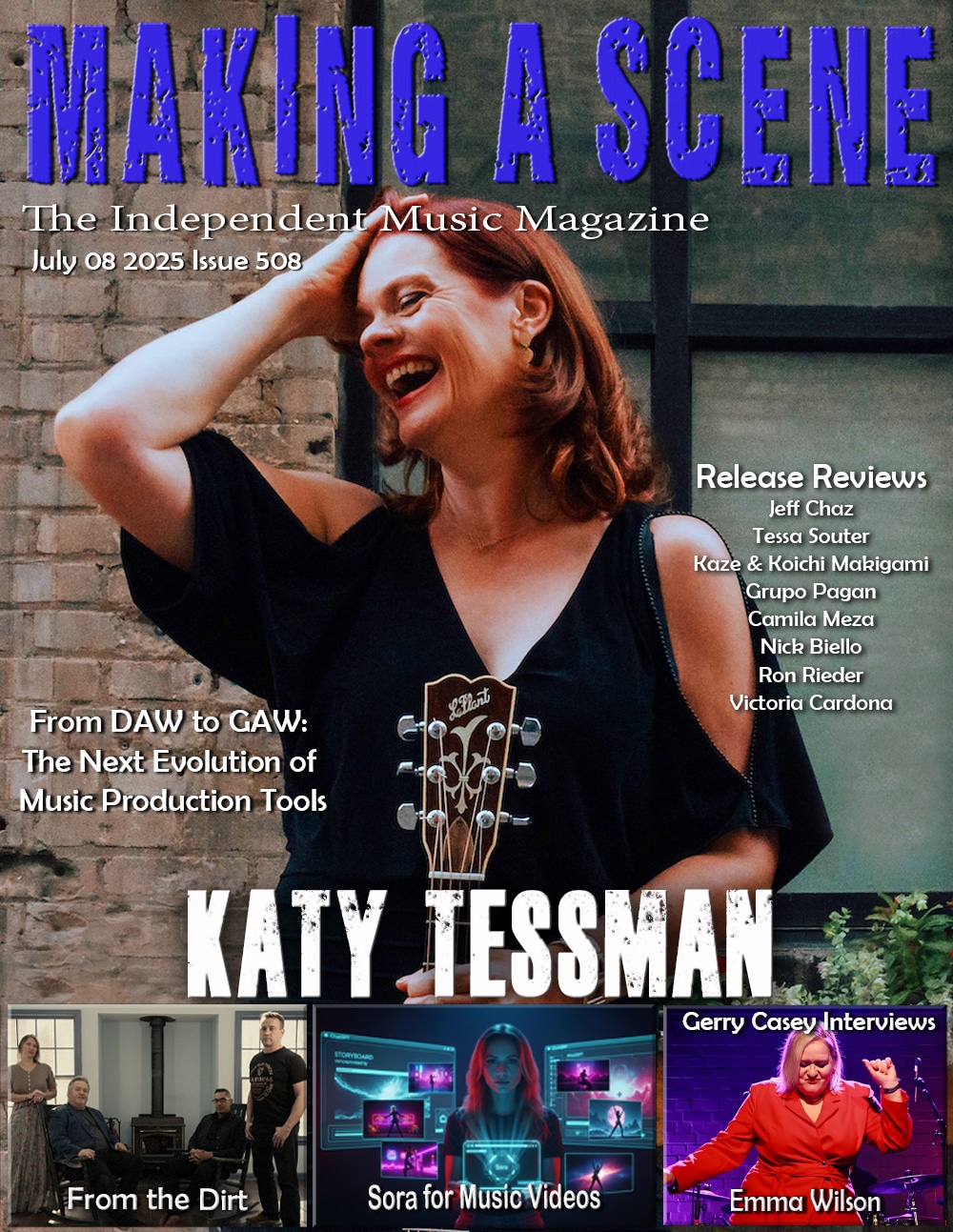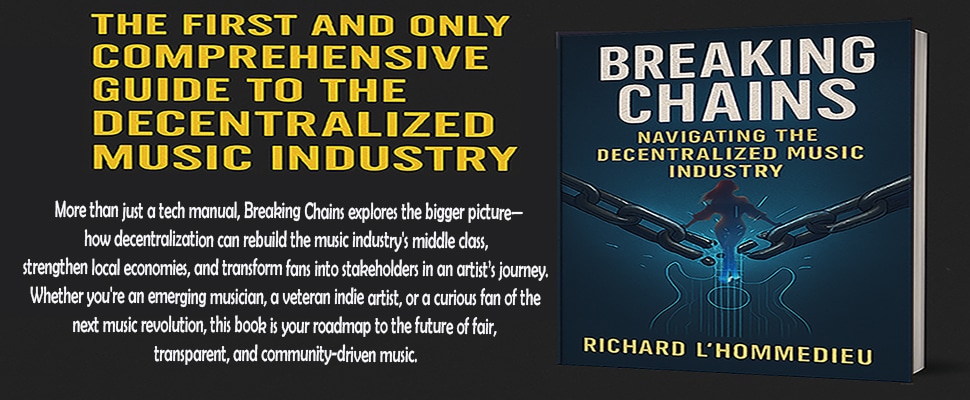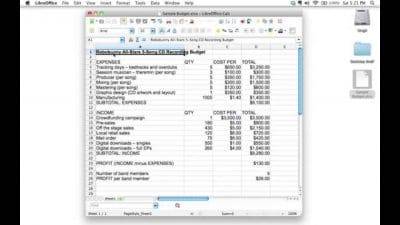Writing a Business Plan For your Music
The Indie Artists Guide to Writing a Business Plan
When it comes to the independent musician, the music business can be a strange, frustrating and scary concept. A good first step for any indie artist who is serious about creating a career in music, is to create a business plan. The Business plan will act as a roadmap to help the Indie Artist negotiate the music business and help them identify their strengths and weakness and more importantly, once identified, learn how to address them.
What is a Business Plan?
The mere mention of a business plan can make many of you freeze in fear. It sounds like a some mystical book of numbers and formulas that will take a business degree to understand. Nothing can be further from the truth. A business plan is a simple outline your goals, how you can achieve those goals and outlines the resources that you have or need to get to reach those goals. It is basically a roadmap of your career and your business. It is the plan that takes you from the Dream to what actions you need to take to get there.
Why Write a Business Plan?
Basically the business plan will allow you to focus and set a realistic plan with realistic goals! The business plan can be used to help bring in key people and companies you would like to make part of your team, such as prospective managers, agents, labels. Having a business plan will shows these people that you have thought about your career, planned how you want to achieve your goals and treat your career seriously. You can also use the business plan if you are looking to secure some financing for new equipment or to underwrite a tour.
Getting ready to write a Business Plan
Do your research, This article will give you a good framework to work from, but get a good book on the subject of writing a business plan or you can get an Audio book to listen to while you are on the road. Second, BE REALISTIC AND HONEST WITH YOURSELF! Nothing will sink your business plan faster than unrealistic goals and an over estimation of your resources. If your goal is to be a star and make 2 Million a year writing songs from your mansion, keep in mind the amount of musicians that are out there trying to make it vs the small percentage of artists in that top tier. You would be better setting your goals to creating a sustainable income that will allow you make music your career.
Make an outline of your goals, Resources and needs. You will use this outline as you start to write your business plan.
Parts of a Business Plan
Your Business plan is a “Living Document”, it will change over time. It will also change depending on who you are presenting this plan to. Even if you are just using it as a guide to where you want to go and what you feel you need to do to get there. The reality is, as your band moves towards it’s goals, your resources will change and your goals will change, so your plan will change as well. Breaking it down to basic sections will allow you to update your plan easily. You would add or subtract sections depending on what you are doing or who you are presenting it to.
1. Executive Summary
The executive Summer should be single a page that introduces the band and provide a synopsis of your marketing plan. This would also be where you would personalize the plan to who giving this to. If it is to a bank, you would outline how much you are looking to finance and what the money will be used for.
2. Introduction
This is where you would have a more extensive bio of the band. If the plan is for a specific project (ie: Recording a CD, Setting up a tour, etc.) this is where you would outline that project.
3. Mission Statement
This is a short statement that explains who you are as an artist.
4. Vision Statement
Again this is a short statement outlines your goals as an artist.

5. Music Industry Overview
This would be a section that you would include if you are presenting your plan to someone who is not educated in the Music Business. A simple page that explains how you or your band fits within the Music Business. For example what is a Recording and touring artist, what does a booking agent do, what does a radio promoter do, etc.
6. Band/Artist Bio, History, and Functions
This would be more a resume of the band, accomplishments, key moments and it’s here that you would introduce the bio of the individual band members. You should also indicated who is doing what jobs for the band, For Example you can indicate the Bass player is working as a booking agent and the drummer is also producing and editing the bands music videos. You can also list any additional team members in this section, such as your PR Person, Booking agent, Radio Promoter, etc. This is also a good way to outline who is doing what within your business.

7. Your Market
This is THE most important aspect of your marketing plan, knowing your market. It is the artist who really knows who their audience is, stands out!
You should be tracking who comes to your shows. Do you have more women or men that show up at a gig? Are these people with disposable income, or do they nurse that beer all night. What other artists do they listen to, or go to see live. How do they get their music, CD’s, Downloads, Streaming? The more information you have about your market the better you can understand how to get them at your show. This also applies to markets you want to attract! For example, If you are looking to attract more women under 28 to your shows, then you need to know what women under 28 need to attract them to your show.
Keep in Mind your music is not going to be for everyone, but with a good understanding of your target market the better chance you will be able to expose them to your music.

8. Graphics and Branding
How you present yourself as an artist or band will determine the market that will be attracted to your shows. Your graphics and branding are an important part of your marketing plan. You should also determine how you are going to describe your music, the genre you are going to identify with. How you identify your music Genre can determine your market as well. If you are a “Country” artist, you will attract a very specific market, or you can us other identifiers to create curiosity or interest with younger markets such as “Alt Country” or “Indie Blues” .
9. Recording Project
If you are using the business plan for a recording project this is where you would put in the information about the project. Include information on who is producing this project, The engineer, any sessions players you are using, the studio you are going to use. Add bios of any additional players, producers and engineers. What is your timeline for the project.
This is also a good place to establish a budget for this project. Create a spreadsheet that allows you to input how many hours (and cost) of the actual recording, Mastering costs, Musician costs, pressing and packaging, radio promotion, packaging for mailings, postage for mailing to reviewers and radio stations, posters, ads, digital agrregators etc. You should also keep track of all sales of the CD as well once it is released.
You may decide to purchase the hardware and software to create your own studio to record your music. Here is where you would also outline the cost of this equipment. Sometimes this can be more cost effective then paying the hourly fee at a studio free you from the stress of watching the clock.
This will help you determine your “Return on Investment” or how many copies of your new project you have to sell before you recoup the cost of it’s production and marketing. This will reveal pretty quickly if you are making good business decisions on any recording project.
10. Press Kit
Here you can outline what is to be included in your press kit. Whether you are going to have a physical kit or an electronic press kit or both. Again what are the costs of producing each kit and the cost of sending that kit to any prospective buyer.
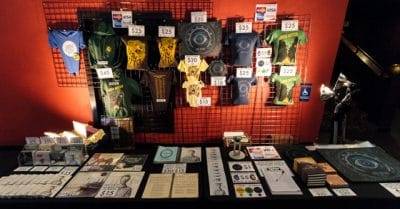
11. Additional Merchandise
Let’s face it, your CD is most likely the least profitable item on your merch table. Once you have sold a CD to someone, they will not purchase it again, You will quickly saturate your market and your merch table will be very quite, very quickly if you don’t have an well stocked merchandise plan. As any band with extensive touring experience will tell you, it’s all about the merch. I have known artists whose take at their merch table would be double their guarantee for the show. Again keep good records on what items you have on your merch table, how much it costs and how many you sold and for how much.
You will be able to see what sells good and what does not, what sizes sell the most and which ones sit for a while, etc. The bottom line it’s all about keeping good records and know what works and what does not. This is Good Business!
If you are looking for good ideas on how to merchandise your band check out this article.
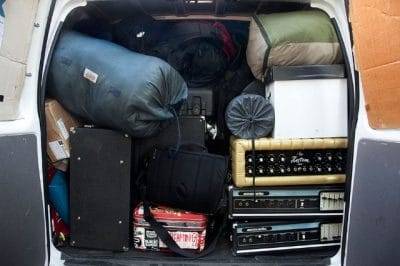
12. Touring Plans
Okay, here is a reality check. The Job of Musician is touring! If you don’t spend more time in your van then you do on stage then you are doing something wrong. Going on tour is not easy, and it’s not something you go into without good planing.
You need to again create a budget spreadsheet that includes how much you are going to spend on gas, Rooms (yes you are going to need a place to sleep even when you don;t have a gig that night), paying the band, food, strings, sticks for the drummer, wear and tear on the van, Oil Changes, Laundry, and make sure you have a reserve fund just in case you break down or you have to bail someone out. See Tips for the Touring Musician
As you book the shows, with a good budget you can quickly see if you will make money or lose money on the tour.
Its here you will also outline your “Tour Support” marketing. Are you sending posters to the venues in advance of the show? Are sending a press release to the press outlets in the area of the venue? Are you doing social media marketing in advance of the show? Do you need to setup interviews with the local radio stations? Have you established a mailing list for this market?

13. Connecting with your Fan Base
Your Fan base is your biggest asset as a touring artist. They are the what makes your business profitable. They scome to the shows, buy your merch and help spread the word about your and your music. With today’s access to social media platforms such as facebook, instagram, snapchat, twitter, etc., it is important to keep your fan base engaged with you and your music.
You need to outline your plan to keep your fan base informed of what you are doing, news of any upcoming shows or releases. Who is going to be responsible for posting and interacting with your fans, what are you posting and when? You should also keep an eye on your fan base to see what platforms they are using to get their information. We all know how fast the social media technology changes and you have to change with it.
You can post a instragram photo of you in front of the venue when you arrive to loadin .. do a facebook live video of the band on the road. Some behind the scenes pics and videos can help your fan base feel engaged and invested in your and your music.
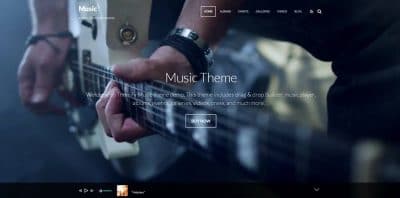
14. Web site
As old school as you may think this is, having a really professional looking website is VERY important! This is your first impression to the music industry. It is the hub where your social media, Electronic Press Kit, Pictures, Tour Schedule, Branding, video’s, streaming players all come together to promote your band and music.
Have a good website development plan that keeps your site up to date and establish who is going to take on this responsibility. Are you going to use Reverbnation for your tour schedule or are you going to input the dates directly on your site. How often are you going to post new content (pics, videos, tour dates)?
Are you going to setup a merch store to sell your merchandise online and if so, how are you going to accept payment, and fulfill those orders.
Are you going to have an area that allows your fans to interact with your site? Are you going to have newsletter and how are you going to capture email addresses. How can you capture demographic information from your fans from your website?
Here is a great review of the Themify Themes and Builder for WordPress
15. Partnerships with Other Artists
Do you have relationships with other artists or do you tour as a supporting act to a larger act? This is a great place to add what artists you have toured with or have opened for while on tour.
16. Video Production
What was once a luxury reserved for only the top selling artists now has become a necessary part of any independent musicians business plan. The good news is the cost of doing a music video has dropped significantly! With the advent of inexpensive HD and even 4K video on Smart phones or Action Cameras like the GoPro, it is now possible for an independent artist to produce a professional music video for a fraction of the cost of what it use to cost.
[amazon_link asins=’B074X5WPC5,B01M14ATO0,B071GX91K5,B00FEQ6OSW,B073X69CD8,1521721041,B0144JUQ0Q’ template=’ProductCarousel’ store=’maasc-20′ marketplace=’US’ link_id=’eed14726-9031-11e8-b817-97fc0409e4e4′]
You should create a timeline for at least 3 or 4 Videos for each release you record. You should also consider creating a “Pre-Release” “making of” video as well.
You should again create a budge spreadsheet for the cost of creating these videos. Either hiring someone to shoot and edit the video’s for you, or purchase the equipment to do your own.
The John Pagano Band used only a Iphone to shoot their latest video, you can read about it here. You can also learn How to Create Music Video on a Budget Here!
17. Additional Revenue
As a working musician one of the most important concepts you need to come to terms with if you want to make music your career, is the fact you need to have multiple income streams. In this section you can outline any additional streams of income you can create using your music. Whether it is acting as a booking agent for other bands, Teaching music (even on the road you can teach via skype), Songwriting for other artists, creating music for Local Commercials, Film, Tv, etc.
The more income streams you are able to identify and take advantage of the stronger you business becomes.
18. Sponsors/Investors
Most investors would like to know if there are other sponsors and investors involved in the project. They seem to feel more assured if there are other investors involved. This also gives you a chance to highlight any sponsorship
deals that you have been able to secure. You don’t need to get into the details of how much investors have put in (this will show up in your financial statements) but you should list them.
19. Strengths/Past Successes
This is really your chance to get out there and strut your stuff. Let the reader know what the strong points about the band/artists are. List key past successes and milestones that you have already achieved. You definitely want the reader to be excited about the project, the band and where you have already been. This gives you a chance to show your track record – you could show past sales (if they have been strong), successful tours, key gigs, awards and honors, etc
20. Challenges
Here is where you can list any challenges that you are currently facing. Now Be honest with yourself. This may include financial concerns, band member relations, weak business skills. More importantly, you should show how you are working to address and solve those particular problems and challenges. This section is important because once you have acknowledged what you challenges are you can start to address them.
21. Goals
Here is where you set your goals for the next 6 months, 1 year, 3 years and five years. For each goal, you should be stating what you want to achieve, when you want to achieve and how you will measure your success. This is a great tool for you as well to see if you are on track. A detailed timeline should also be included in the appendix. Make sure you reference to it in the business plan. The best format for this is a calendar or a chart where you can plot all your dates and what you need to have achieved by then.
22. Assumptions/Scenarios
This is important for traditional investors. Here is where you state what assumptions you are using to base your success and financial statements on. How did you estimate your sales? What formula did you use? How did you
estimate your costs?
What key people are necessary to your success? What events/actions are key in your marketing plan to be successful? More importantly, you should indicate what alternatives you have considered if your estimates and assumptions fall through in order to ensure success.
23. Financial
Ok, here comes the scary and most eye opening part of the business plan. This is where you put all those costs and estimate spreadsheets together and create your cost/profit financial report. Now, if your sales and costs are estimates, you should be basing it on past successes or a really thought out formula. Really look at what other artists are selling and ask yourself if you are really being realistic? Call to ensure that the costs that you have set out for yourself actually make sense. If you have been around for awhile and have kept track of your past financial
information, you should be including it in this section.
The most common forms of financial reports are Balance Sheet, Income Statement and Cash Flow/Budget. These do not need to be included specifically in the business plan (they can be put in the appendices); however, they should be summarized in your financial section. What are your costs, sales and do you know when you will need the most money?
Finally, some institutions/investors will require that you provide a list of collateral that will go towards the loan. You can list your tour van, Pa System, Recording Equipment, etc.
24. Conclusions
Your conclusion should sum up the band, the project, your request, and why you believe that this is a successful project and why your reader should invest in it. Keep it short, no more than a page should do it.
25. Appendices
All your appendices come at the end of the document and they should be used to provide any supplemental information, but the business plan should be able to stand alone.
You don’t need to have all the sections outlined in here. It was created to cover a variety of genres, situations and career levels. Choose sections and develop your business plan to fit your needs.
Buy Us a Cup of Coffee!
Join the movement in supporting Making a Scene, the premier independent resource for both emerging musicians and the dedicated fans who champion them.
We showcase this vibrant community that celebrates the raw talent and creative spirit driving the music industry forward. From insightful articles and in-depth interviews to exclusive content and insider tips, Making a Scene empowers artists to thrive and fans to discover their next favorite sound.
Together, let’s amplify the voices of independent musicians and forge unforgettable connections through the power of music
Make a one-time donation
Make a monthly donation
Make a yearly donation
Buy us a cup of Coffee!
Or enter a custom amount
Your contribution is appreciated.
Your contribution is appreciated.
Your contribution is appreciated.
DonateDonate monthlyDonate yearlyYou can donate directly through Paypal!
Subscribe to Our Newsletter
Order the New Book From Making a Scene
Breaking Chains – Navigating the Decentralized Music Industry
Breaking Chains is a groundbreaking guide for independent musicians ready to take control of their careers in the rapidly evolving world of decentralized music. From blockchain-powered royalties to NFTs, DAOs, and smart contracts, this book breaks down complex Web3 concepts into practical strategies that help artists earn more, connect directly with fans, and retain creative freedom. With real-world examples, platform recommendations, and step-by-step guidance, it empowers musicians to bypass traditional gatekeepers and build sustainable careers on their own terms.
More than just a tech manual, Breaking Chains explores the bigger picture—how decentralization can rebuild the music industry’s middle class, strengthen local economies, and transform fans into stakeholders in an artist’s journey. Whether you’re an emerging musician, a veteran indie artist, or a curious fan of the next music revolution, this book is your roadmap to the future of fair, transparent, and community-driven music.
Get your Limited Edition Signed and Numbered (Only 50 copies Available) Free Shipping Included
Discover more from Making A Scene!
Subscribe to get the latest posts sent to your email.
